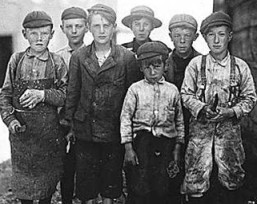Long before health and safety was invented, before ‘risk assessments’ unified a workforce with a sigh, and compulsory education was implemented, children were commonplace in factories, mines and other workplaces.
William was the fourth of the twelve children of my Great Great Grandparents, James Martin and his wife Sarah Elizabeth (née Giddings), and one of two of their children to die that year.
An inquest was held at Pyemoor, on the body of William Martin, a boy of ten years of age. He was entrusted, the previous day, with a horse and manure cart. He was lifted on the horse and afterwards found face downwards on the ground with an internal injury and died before the doctor arrived. The jury returned a verdict of “Accidental Death”, expressing their disapproval of children so young being entrusted with a horse and cart, the boy’s master being one of the jury – 31st July 1890.
Like most of those families living in fenland during the 19th century, children working in agriculture meant that the family could afford to keep food on their table and avoid the workhouse.
Whether William, at 10yrs of age, was employed or whether he was just there, is unclear (‘master’ may have been employer or his father), but his accidental death would never have been an easy situation to deal with.
The Factory Act (1878-1901)
The Factory Act (1878) meant that children under the age of 10 could not be employed in any trade, and that compulsory education ran up until the age of 10.

This act was key at keeping the youngest of children away from dangerous environments such as mills, mines, glassworks, and other industries with heavy machinery – or at least it meant that those who continued to employ children under 10 could be prosecuted (and this was quite common).
The act also meant that 10-14yr old children were allowed to work half-days.
The act was revised again in 1891, upping the age to 11 years, and again with the introduction of The Factory and Workshop Act in 1901 to 12 years.
The slow pace of laws to protect children in the UK, and the harsh reality of bringing up a family on a railway labourer’s wage, may have contributed to William going to work at aged 10 on that fateful day.

Such a tragic story!
LikeLike